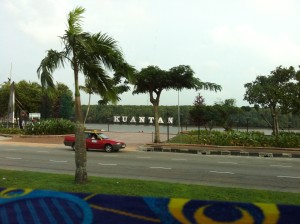By Erin D’Amelio
During my excessive anticipation of my trip to Malaysia (which now seems forever ago), I discovered an article, “English is a Dialect With an Army,” written by Ta-Nehisi Coates of The Atlantic whose message resonated with me so strongly today. The premise of his article highlights a larger theme of living abroad; Coates spent a few months in Paris and reported on the struggles of being an expat. Just when his tales (praises, really) of the Parisian mode de vivre wrapped me up in hundreds of memories from my semester abroad, I couldn’t help but be struck by his apt analysis of living in an unfamiliar country, no matter the length of stay. Despite the age on the article, a certain degree of perpetuity clings to his words, especially those that describe the power struggle whilst living in a country where English was not the native tongue:
“Somewhere in your home there is button which could erase civilization. And then you come to this place and find yourself disarmed. You see that [this country] has its own culture, its own ages and venerable traditions, that the people do not tremble before you.”
I underwent a similar disarmament today in the completely distinct and unfamiliar world of Malaysia. Here’s the scene: Our Pahang State Department officer, Chandra, tasked us 20 ETAs, paired with our district roommates, to complete an “explorace,” a.k.a. a scavenger hunt, that sent us to a small diameter of shops and restaurants around our hotel in Kuantan. Our clues were in English, but our job was to speak to locals in Bahasa Malaysia, asking them simple questions like, “What is the most popular book in Malaysia right now?” or “What are the ingredients in roti canai?” At each station was a monitor, who would make sure that we spoke BM and sign our clues so we could move to the next station.
It seemed simple enough, but I felt entirely helpless trying to ask these questions. First of all, it is important to note that our BM classes in KL inundated us with vocabulary, but our application of the language has been sparse. In KL, it was too easy to not use BM aside from terima kasih (“thank you”). English was everywhere, and the color of my skin gave this unspoken license to accommodate the ignorant American trope. While in Pahang, we’ve only had one BM refresher class, but no emphasis was placed on us mastering the pronunciation: our teacher only went through conversations and we jotted down whatever vocabulary we didn’t yet know. Plus, our vocabulary did not include the words “popular” and “ingredient.” So, getting out there in the real world, and actually trying to form sentences with the incredibly limited vocabulary we have, was probably one of the most debilitating experiences I have ever had. There were so many words that I didn’t know, prepositions that evaded me, and I must have looked downright silly to the Malaysians to whom I asked about their pharmacy’s opening and closing hours.
Now, I don’t expect nor do I want to maintain a finger over this “power button” of knowing English Coates discusses in his article. I really do want to improve my Bahasa Malaysia while I’m here and communicate with the people of my community, and I don’t want to have everyone around me defer to English (except for my students, of course). Not being able to coherently speak in simple sentences today (we’re ignoring my lack of BM education here) was so frustrating. This feeling of disarmament bothered me so much, not because I couldn’t use my mother tongue, but because I couldn’t use theirs. Despite the ethnocentric undertones of my task here in Malaysia, teaching students English, I heartily desire an equal cultural exchange. I want to experience those venerable traditions and people, and one of the best ways to accomplish that, in my opinion, is the use of the native tongue. I felt far more comfortable interacting with Parisians and French culture when I was abroad because I had a good handle of the language; I sincerely wish for the same habituation here in Malaysia.
My name is Erin D’Amelio and I’m going to Malaysia for ten months as a Fulbright English Teaching Assistant. Over the next 10 months I will be submitting regular journal entries of this incredible adventure, documenting my thoughts and experiences. The views and beliefs I will present in these articles are my own; they do not reflect those of the Fulbright Program or the U.S. Department of State. Below are the articles, in order of publication. Just click on any link and continue the journey with me.
An Unforgettable Journey
How Does One Get a Fulbright, Exactly?
And Then We Wait
Expectations
Sensory Overload
(Almost) Hitting the Ground Running
Barriers



What are the ingredients in roti canai? @LehighHappening http://t.co/EwcCKFDW1s